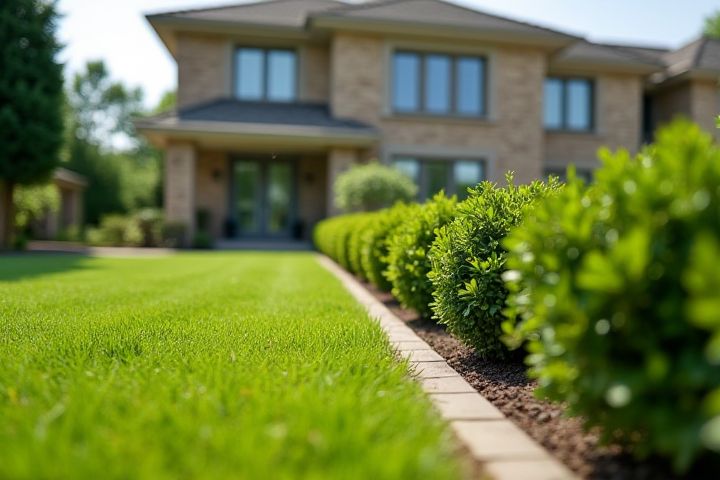
Homeowners typically maintain house landscaping, ensuring that gardens, lawns, trees, and shrubs are kept in optimal condition. If you prefer a hands-off approach, professional landscapers offer services such as garden design, maintenance, and seasonal clean-ups. Many neighborhood associations also have landscaping guidelines, influencing how properties are maintained for aesthetic consistency. You can enhance your home's curb appeal with strategic landscaping choices, including native plants that require less water and maintenance. Seasonal changes often necessitate different care routines, making it essential to stay informed about the specific needs of your landscape throughout the year.
Who Maintains House Landscaping
Homeowner responsibilities
Homeowners play a crucial role in maintaining their house landscaping by regularly mowing the lawn, which typically requires cutting grass to a height of 2.5 to 4 inches to promote healthy growth. You should water plants and lawns adequately, providing about 1 to 1.5 inches of water per week to ensure optimal hydration. Regular pruning of shrubs and trees helps to enhance plant health and aesthetics, with specific pruning times varying by species and season. Maintaining mulch beds, usually 2 to 4 inches thick, not only conserves moisture but also reduces weed growth and adds aesthetic appeal to your outdoor space.
HOA or community guidelines
Homeowners associations (HOAs) or community guidelines typically maintain house landscaping standards, ensuring aesthetic uniformity and property value protection within the community. These regulations often specify acceptable plant types, landscaping designs, and maintenance practices to encourage visual harmony. For instance, many HOAs mandate regular lawn care, including mowing every two weeks during the growing season, and require approval for major alterations to your landscape. Compliance with these guidelines is crucial, as violations may result in fines or mandated corrections to your property.
Landscaping contracts
Landscaping contracts are often maintained by professional landscape architects, designers, or landscaping companies specializing in various outdoor design and maintenance services. These entities typically handle everything from garden design to lawn care, ensuring your landscaping meets aesthetic and functional requirements. A well-structured landscaping contract includes detailed descriptions of services, timelines, costs, and maintenance schedules, which can range from weekly lawn mowing to seasonal planting. Understanding these components is crucial for maintaining the health and appearance of your landscape over time.
Tenant obligations
Tenant obligations for house landscaping often include regular lawn maintenance, such as mowing at least once a week during the growing season. Tenants might also be responsible for weeding garden beds, trimming shrubs, and ensuring that any planted flowers or vegetables are well-watered and healthy. Depending on the lease agreement, you may also need to keep outdoor spaces clean by removing debris and leaves on a monthly basis. Failure to adhere to these landscaping duties can potentially result in deductions from your security deposit or even lease violations.
Property management rules
Property management companies typically oversee house landscaping by adhering to established property management rules and guidelines. They ensure that the landscape design enhances curb appeal and meets community standards, often using a team of professional landscapers. Regular maintenance, including lawn care, plant health assessments, and seasonal clean-up, is crucial for the landscape's longevity and aesthetics. By managing these aspects, property managers help maintain property value while creating an inviting atmosphere for residents and visitors alike.
Division of labor within family
House landscaping maintenance typically relies on a clear division of labor within the family, with each member assigned specific tasks based on their skills and preferences. For example, one person may handle mowing the lawn weekly, while another could be responsible for planting seasonal flowers, enhancing curb appeal by approximately 15%. Children might be tasked with weeding or raking leaves, instilling a sense of responsibility and teamwork. This collaborative approach not only creates a well-kept outdoor space but also encourages family bonding through shared accomplishments.
Professional landscaping services
Professional landscaping services are maintained by skilled horticulturists, landscape architects, and dedicated maintenance teams. These experts bring extensive knowledge in plant selection, garden design, and soil management to ensure your outdoor space thrives year-round. Many services offer tailored packages that can include seasonal planting, lawn care, irrigation systems, and hardscaping features like patios and walkways. Investing in professional landscaping can increase your property's value by up to 15%, making it a wise choice for homeowners aiming for both beauty and functionality.
Seasonal maintenance needs
Landscape maintenance professionals typically focus on seasonal needs to ensure optimal health and appearance of your garden. In spring, they might implement fertilization and planting strategies, while summer often requires irrigation management and pest control. Fall maintenance includes pruning and preparing plants for winter, whereas winter tasks may focus on snow removal and protecting vulnerable vegetation. Depending on your location, the specific services may vary, but regular seasonal attention is essential for vibrant landscaping year-round.
DIY landscaping tips
Homeowners interested in DIY landscaping can benefit from valuable insights provided by local gardening centers and online platforms. Resources such as YouTube tutorials, gardening blogs, and community workshops offer practical guidance on everything from plant selection to design techniques. Engaging with local gardening groups can connect you with experienced landscapers who often share their expertise and personal project examples. Your commitment to DIY landscaping not only enhances your property's aesthetic appeal but can also increase its market value by up to 20%.
Environmental considerations
Homeowners and landscape professionals play a crucial role in maintaining house landscaping with a strong emphasis on environmental considerations. By utilizing native plants, which require less water and are more resistant to local pests, you can significantly reduce your ecological footprint. Implementing sustainable practices such as rainwater harvesting and organic fertilizers enhances soil health and promotes biodiversity. Regular maintenance efforts, such as mulching and proper pruning, not only keep your landscape thriving but also minimize the need for chemical interventions.
